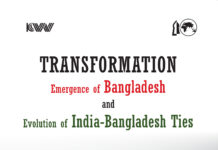The deeper politics of deep sea ports

The Belt and Road Initiative (BRI) is a development strategy of the Chinese government aimed at enhancing regional connectivity and cooperation among the Eurasian countries—primarily the People’s Republic of China and the countries that spread along the historically famous land-based Silk Road Economic Belt (SREB) and the Maritime Silk Road (MSR).
BRI is designed to address an infrastructure gap along several land corridors of Asia, Europe and Africa and in maritime countries of Asia, Europe, Africa and Oceania. The proposed infrastructure development projects including deep seaports, highways and railways in Bangladesh under BRI for regional connectivity, should be given utmost importance by the Government of Bangladesh for modernising and expanding the existing infrastructure facilities in the country, which have been acting as serious bottlenecks in the way of our economic development.
Bangladesh became a part of the regional cooperation arrangement known as the Bangladesh-China-India-Myanmar Economic Corridor (BCIM-EC), also known as the Kunming Initiative, which was vigorously pursued by both India and China up to 2014. But after the election defeat of the Congress-led coalition government in India in 2014, the UPA government led by BJP’s Narendra Modi virtually abandoned the BCIM-EC agreement for its changed regional geopolitical strategy, where India considers China as its foremost regional adversary and superpower rival. Therefore, India has forged a strong alliance with the USA and Japan to deny China easy access to the Bay of Bengal and the Indian Ocean.
It is alleged that pressure was exerted on Bangladesh in 2014 to cancel a financing arrangement with China to build a deep sea port in Sonadia of Cox’s Bazar. Earlier, a feasibility study conducted by a Japanese firm in 2009 recommended to build the Sonadia Deep Sea Port in phases.
Prime Minister Modi has been propagating a new regional cooperation arrangement since then styled as BBIN Framework including Bangladesh, Bhutan, India and Nepal. Needless to say, the BBIN framework will be a very poor alternative to BCIM-EC. But it seems the BCIM-EC will not be implemented in the near future. The future of Sonadia Deep Sea Port project is now uncertain. Under the BCIM-EC arrangement, two projects for building a railway line and a highway connecting Bangladesh’s Ukhia in Cox’s Bazar with China’s Kunming City and the Yunan province through Myanmar were taken up for implementation. The Bangladesh part of the railway line is being constructed, but the Myanmar parts of both of the railway and highway projects seem to have been abandoned by Myanmar.
Earlier, China helped Myanmar to build a deep sea port at Sittwe (former Akyab), capital of Rakhine State, to overcome the problems of its Yangon Port. India has taken up the Kaladan Multi-Modal Transit Transport project linking Mizoram of India with Sittwe to provide the land-locked “Seven Sisters” states of North-east India a vital ocean link for international trade through the deeply excavated and broadened Kaladan River. But after its failure to obtain clearance for Sonadia, China quickly embarked on a new cooperation arrangement with Myanmar for building another deep sea port and a special economic zone in Kyaukphyu, about 100km south of Sittwe. It should be clear that both China and India are vying for Myanmar’s favour for their own geo-strategic advantages. Obviously, Bangladesh cannot out-compete Myanmar in this geo-political game because of the latter’s vast natural resources as well as geo-strategic advantages.
Meanwhile, Japan International Cooperation Agency (JICA) has been given a contract by Bangladesh to build a deep sea port along with an LNG terminal at Matarbari of Maheshkhali in Cox’s Bazar, not far away from Sonadia. It is claimed that Matarbari Port will provide about 13 metres of depth for deep-draft ships. But experts point out that Sonadia has got a gift of nature in the form of a deep strip of the Bay of Bengal with a natural depth of 15 metres.
Experts advise that Bangladesh should not abandon the idea of building a genuine deep sea port in Sonadia Island. Now that the geo-political rivalry of the superpowers has led to the lack of support for the Chinese-funded deep sea port project, for the time being Bangladesh should start to build the port in phases for its own use with alternative sources of financing, especially in the context of the sad reality that Bangladesh’s prime sea port at Chattogram has become seriously handicapped because of a maximum of only 9.1 metres of available draft for ships.
Chattogram has become a lighterage port where deeper-draft ships and longer ships are anchored at the outer-anchorage in the Bay. Lighter vessels are used to lighter the cargo or the containers to the port at considerable cost involving both money and time. Even the bigger motherships unload their import-cargo or containers at either Singapore or Colombo to be lightered to Chattogram in lighter-vessels. Similar lighterage methods are used for some export items from Bangladesh. A proposed “Bay Terminal” at Patenga coast with a maximum available draft of 12 metres for ships may be able to handle longer ships with deeper draft, but that will not meet the urgent need for a genuine deep sea port for the rapidly growing economy of Bangladesh.
The reality is that Bangladesh cannot antagonise its regional superpower neighbour India, which surrounds Bangladesh from three sides. Bangladesh has a very delicate balancing act at hand in pursuing the opportunities offered by China’s BRI projects. Bangladesh officially became a participant of BRI in 2016, when Chinese President Xi Jinping visited Bangladesh, through signing a number of projects worth USD 21.5 billion. But we have to make judicious feasibility study of plans before accepting Chinese credit for infrastructure projects. We should also carefully study the terms and conditions of the loans to avoid the alleged “debt traps” created in different countries like Sri Lanka, Maldives and Pakistan.
Dr Muinul Islam is a retired professor of Economics, University of Chittagong. He is also an Ekushey Padak recipient.
Source: The Daily Star.









